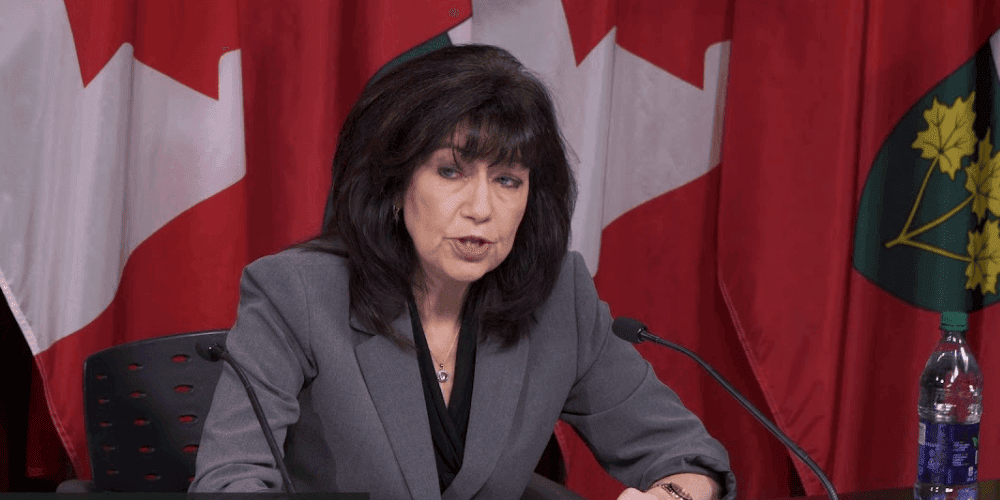QUICK HITS
- Ontario’s auditor general found RECO to be ineffective in regulating the province’s real estate industry and protecting consumers.
- The report highlights several key findings, including RECO’s failure to track complaints and follow up on investigations, complete brokerage inspections and its handling of ethics violations.
- The 51-page report contains 25 recommendations for the regulator.
Ontario’s industry regulator is “not always effective and timely” when it comes to ensuring real estate professionals comply with laws and regulations, according to a new report from the province’s auditor general.
On Wednesday, Bonnie Lysyk released her annual report on the government’s spending, which included detailed findings on the Real Estate Council of Ontario’s (RECO) inner workings. The province’s Ministry of Public and Business Service Delivery oversees RECO.
The 51-page report includes a laundry list of what Lysyk calls “significant concerns” about how RECO operates and details the regulator’s lack of policies and consistent processes.
Among findings, the auditor general discovered that the industry rarely reports cash and suspicious transactions. The Financial Transactions and Reports Analysis Centre of Canada (FINTRAC), which monitors money laundering, received zero reports of large cash transactions between 2017 and 2021 and only 18 reports in the 2021/22 fiscal year from brokers and salespersons. Realtors and brokers are required by law to report suspicious transactions.
The report also found that between 2017 and 2021, 78 per cent of fines issued by RECO were $10,000 or less, “In (the auditor general’s) review of a sample of discipline cases, we found that 67 per cent of registrants were fined a lower amount than the commission earned in the related real estate transaction,” the report states. “When a fine is significantly lower than the commission earned, the fine may not act as a sufficient deterrent to future misconduct.”
One disciplinary case reviewed by the auditor general showed the registrant, representing the seller of the property, failed to inform prospective buyers (as required) that offers had been placed by the registrant’s own clients and that the registrant entered into an agreement to reduce their commission to double-end the sale. RECO fined the subject $5,000, while the commission on the property was $82,800.
The auditor general’s office also found that RECO doesn’t have a process in place to ensure a proper inspection of brokerages is completed on a timely basis to assess compliance. According to the report, “RECO has never performed a full on-site inspection at 27 per cent of registered brokerages and has not conducted a full on-site inspection at a further 35 per cent of brokerages in more than five years.”
According to the auditor general, RECO rarely followed up on violations found during brokerage inspections to confirm they had been corrected. “These inspections identified significant violations, including shortages in the brokerage’s real estate trust account where client deposits are held,” the report said. The investigation also found there is no process in place that tracks whether investigators complete their investigations within a reasonable amount of time or take appropriate action based on their findings.
Overall, the report contains 25 recommendations with 63 action items. RECO promises it is actively working on a plan to address the recommendations in the report and will provide it to the Minister of Business and Public Service Delivery in the spring of 2023.
“We appreciate the opportunities the auditor general’s report presents to enhance the important work we do,” says Michael Beard, CEO of RECO, in a press release. “And we are pleased that so many of the recommendations align very closely with our strategy to modernize our approach to administering the law in the public interest.”
The Ontario Real Estate Association (OREA) says new provincial legislation will address many of the findings in the report. In 2020, the Ontario government passed the Trust in Real Estate Services Act (TRESA), replacing the decades-old Real Estate and Business Act.
TRESA includes updates to RECO’s regulatory and enforcement powers; changes to eligibility requirements for registration; regulatory changes to enhance consumer choice in the transaction process; and enhancements to ethical requirements for real estate professionals.
“With the passage of TRESA and the ongoing introduction of supporting regulations, Ontario is on the right track when it comes to strengthening consumer protection in real estate,” says Time Hudak, CEO of OREA. “OREA was pleased to see the auditor recommend stronger policies around criminal background checks, money laundering and stopping agents from profiting from breaking the rules.”
Hudak says many of the new rules go into effect in April 2023.
The auditor general’s full report can be found here.

Jordana is the editor of Real Estate Magazine. You can reach her by email.
















The auditor fails its own audit. Miserably!
Arguably this audit should have taken place no later than during the consultation process regarding changes to REBBA 2002, but it is nontheless welcome and shines a light on just how ineffective and political (OREA’s political management) and industry controlled (75% registrant directors), is RECO as a Consumer protection body.
It was especially pleasing to see it tackle that top-heavy industry presence to which I have always been opposed, I expect nothing will be done about it or any of the other consumer protections suggestions advanced. But, not mentioned was how long it actually takes RECO to implement regulatory changes. What was it 5 years since the consultations began to changes to the act, most of which won’t even be in place by April 2023.
There are many eye-popping take aways from the report such as why It also seemed strange that the number of cases published were diminishing. The 122 kept secret would by highly informative as to why, should they see the light of day, and which perhaps would be instructive as to the reason for lollygagging investigators with low charge referral rates. Or why, as an NFP, it has maintained a growing surplus which annually is almost as much as registration revenues. Or the rather sizable number by multiples, of insurance claims versus internal or provincial actions/charges and the cases behind them – another secret.
Are these claims any wonder though when RECO allowed 1700 applicants with admitted crinimal charges such as fraud, theft, assault to be registered without so much as a raised eyebrow? How many didn’t admit is another question and the further irony is that those caught not admitting to a criminal record were punished with either denied registration or a fine as if that makes a difference as to moral character.
One other eye-popping discloisure was the education fees. RECO was paid 5% of all education revenues in excess of $20 million by Humber which in 2021 amounted to $4.7 million and which means Humber took in $114 million. This from the educator that couldn’t even adequately protect its onlne education system from being abused by $350+ cheaters, yet, that revenue rate would cover 30,800 hopefuls per year at 2021 fees for all pre-registration courses.
I don’t know who you are PED but your response to this article is excellent.
RECO, OREA and the bureaucracy surrounding it are long overdue for a shake up. The current education program is a farce and there seems to be no interest in OREA and RECO to make changes to the current way they conduct their business. If the minister would review how Realtors conduct their business instead of reviewing the disciplinary process we could make some real headway in eliminating a lot of the unethical activities. That is however Tim Hudak’s job, and having spoken with Tim in this regard a few times I have found there is no interest to make any substantial changes to enhance public protection. I would just get the typical politician lip service. As long as RECO oversees education (which I disagreed with from the start) and Tim is head of OREA, there will be little change in the industry and how we are all perceived by the public.
Thanks again for your response
I certainly do not think it is Tim Hudak’s or OREA’s responsibility to oversee the behaviour of registrants. OREA has done a great job of pushing for much needed changes to REBBA and has accomplished many positive changes that are being implemented through TRESA. There is certainly a lot left to be done but this is the responsibility of RECO, not OREA.
I agree that education requirements need to much more stringent and professional standards better enforced, but as long as anyone who can ‘fog a mirror’ can get a real estate license then things are not likely to change for the better.
It was a scathing indictment of a bureaucracy that operates to the benefit of no one neither the public or the registrants .We pay ever increasing fees and receive very little, advertising not monitored,cheating on exams, no brokerage inspection .what are these people doing? I for one am calling for the removal RECO tone replaced with specific departments to carry out the various tasks required
It is very interesting to note that RECO the so called governing body for Ontario Realtors has finally been caught not doing or appearing to not do the things it ought in the discipline of realtors across the Province.
When one considers the fact that those so called real estate agencies are
supposed to look after the interests of those of us who are either selling or buying houses. All the other professional watchdog bodies should take note and understand that they are beyond the long arm of the government.
Perhaps we now have an Auditor General in Ontario who is not afraid of calling a spade a spade.
If RECO were anything other than a huge government bureaucracy then the head of the organization would need to resign in shame. Unfortunately that will not happen and we can only hope and pray that some effective changes are actually made.
Registrants who are honest, law-abiding and effective Realtors have known for decades that RECO is not effective in dealing with the corruption, poor business practices and unskilled trade practices demonstrated by a small majority of so-called salespeople. Hopefully this will change as these few “bad apples” bring shame on the industry and the vast majority of excellent salespeople who are there to serve their clients and customers.
The insurance program does a decent job of protecting Realtors who get in a bind but at a very high cost. If the bad apples are removed from the system then perhaps the cost of insurance can also be reduced.